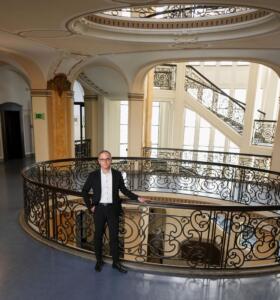Ronny Thomas: The Architect
For years, Ronny Thomas worked quietly alongside Thomas Kühnen at Düsseldorf Higher Regional Court. However, his career truly took flight with the launch of the Unified Patent Court. Even before the court opened its doors, he played a pivotal role in its organisation as a member of the Presidium. Today, as presiding judge of the Düsseldorf local division, he oversees one of the UPC's busiest venues.
19 November 2025 by Konstanze Richter
From his office in the building housing Düsseldorf Higher Regional Court, winter offers particularly striking views of the Rhine river through bare branches. However, Ronny Thomas likely has little time to admire the scenery. For over two years, he has presided over the Düsseldorf local division of the UPC – the second busiest division after Munich. It marks the pinnacle of a career that seems to have been heading precisely towards this destination.
Thomas knew early on that the judiciary was his calling. “A lawyer must always fully represent the client’s interests. But I found it more compelling to examine cases independently,” he explains.
His first steps in intellectual property came during his legal clerkship, focusing on copyright law at Leipzig Regional Court and during his traineeship at CMS Hasche Sigle. “Initially, I was interested in IP broadly. Patent law wasn’t yet my primary focus,” he recalls.
Düsseldorf calls
That soon changed. After gaining experience as a lawyer in Hogan Lovells’ renowned IP practice, he seized an opportunity in 2008 to join one of Düsseldorf Regional Court’s patent chambers. “By then, I knew I would be in patent law for the long term,” says Thomas.
The timing proved fortuitous, as a judicial vacancy coincided with his interest. “While lawyers can choose their specialisation through their choice of firm or practice group, judicial careers depend heavily on available positions. Nevertheless, courts try to accommodate their colleagues’ interests where possible,” he explains.
What Thomas particularly appreciates about Düsseldorf as a patent location is the wide range of technologies that are disputed here. “It’s not just about mobile communications or pharmaceuticals. At both the Regional Court and Higher Regional Court, and now at the UPC local division, we see the full spectrum of technical disputes.”
His docket spans medical technology cases like 10x Genomics vs NanoString and Roche Diagnostics vs Tandem Diabetes Care, pharmaceutical disputes such as Novartis vs Celltrion, and mobile technology cases like the recent Ona Patents v Google case, but also disputes over mechanical engineering and consumer goods such as printing technology, bathroom appliances and water cartridges. “It’s precisely this variety that makes it so appealing,” says Thomas.

Ronny Thomas at the local division Düsseldorf
To render well-founded decisions, judges must deeply understand the subject matter. Düsseldorf judges are renowned for their thorough technical analysis of patents. Thomas, described by lawyers as “highly experienced and conscientious”, honed his skills working alongside the eminent patent judge Thomas Kühnen in the 2nd Senate of the Higher Regional Court, most recently as deputy presiding judge. While Kühnen was tipped as a UPC favourite in a JUVE Patent 2021 survey, Thomas remained relatively unknown to the international patent community.
Thrust into the spotlight
This changed dramatically when the UPC launched in mid-2023. Already involved in crafting the procedural rules through his post on the Presidium, he suddenly found himself in the spotlight as presiding judge of one of the UPC’s busiest local divisions.
For Thomas, the UPC represented a unique opportunity. “I could take my 15 years of experience to an international level,” he explains. He now helps shape the court’s jurisprudence. “Usually, lawyers work within established structures based on years of precedent. The UPC offers everyone — judges and lawyers alike — the chance to actively build these structures.”
Unlike his former colleague Kühnen’s occasionally brusque demeanour, Thomas exudes a friendly, composed presence in court. He opens hearings with case overviews that hint at his preliminary views, listens attentively, head often tilted to the side, and engages thoughtfully with his fellow judges. If discussions get heated, Thomas restores calm with a simple “I think we’ve heard enough”.
While patent litigation involves high stakes and fierce advocacy, “The parties always treat each other fairly,” Thomas emphasises. With at least one judge always from another UPC member state on the panel, proceedings increasingly take place in English. “This international exchange is tremendously rewarding. Where else can you develop new cross-border jurisprudence from the ground up?”

